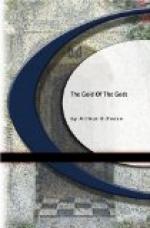Norton shrugged his shoulders. “I believe some weird superstitions were connected with it,” he replied. “It had a three-sided blade, and, as I told you, both the blade and the hilt were covered with peculiar markings.”
There seemed to be nothing more that could be discovered from a further examination of the Museum. It was plain enough that the thief must have let himself out of a side door which had a spring lock on it and closed itself. Not a mark or scratch was to be found on any of the window or door locks; nothing else seemed to have been disturbed.
Evidently the thief had been after that one, to him priceless, object. Having got it, he was content to get away, leaving untouched the other treasures, some of which were even intrinsically valuable for the metal and precious stones in them. The whole affair seemed so strange to me, however, that, somehow, I could not help wondering whether Norton had told us the whole or only half the story as he knew it about the dagger and its history.
Still talking with the archaeologist, Kennedy and I returned to his laboratory.
We had scarcely reached the door when we heard the telephone ringing insistently. I answered, and it happened to be a call for me. It was the editor of the Star endeavouring to catch me, before I started downtown to the office, in order to give me an assignment.
“That’s strange,” I exclaimed, hanging up the receiver and turning to Craig. “I’ve got to go out on a murder case—”
“An interesting case?” asked Craig, interrupting his own train of investigation with a flash of professional interest.
“Why, a man has been murdered in his apartment on Central Park, West, I believe. Luis de Mendoza is the name, and it seems—”
“Don Luis de Mendoza?” repeated Norton, with a startled exclamation. “Why, he was an influential Peruvian, a man of affairs in his country, and an accomplished scholar. I—I—if you don’t mind, I’d like to go over with you. I know the Mendozas.”
Kennedy was watching Norton’s face keenly. “I think I’ll go, too, Walter,” he decided. “You won’t lack assistants on this story, apparently.”
“Perhaps you can be of some assistance to them, also,” put in Norton to Kennedy, as we left.
It was only a short ride downtown, and our cab soon pulled up before a rather ornate entrance of a large apartment in one of the most exclusive sections of the city. We jumped out and entered, succeeding in making our way to the sixth floor, where Mendoza lived, without interference from the hallboy, who had been completely swamped by the rush that followed the excitement of finding one of the tenants murdered.
There was no missing the place. The hall had been taken over by the reporters, who had established themselves there, terrible as an army with concealed pads and pencils. From one of the morning men already there I learned that our old friend Dr. Leslie, the coroner, was already in charge.




